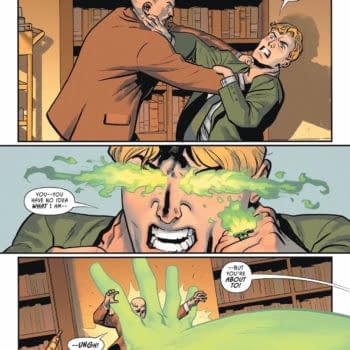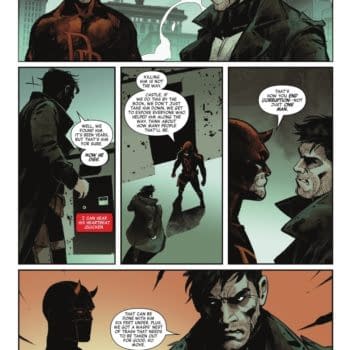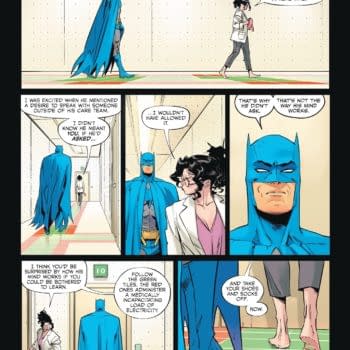Posted in: Comics | Tagged: Aubrey Sitterson, Comics, Dylan Burnett, dynamite, entertainment, Sovereigns
Aubrey Sitterson's Approach To Magic / Doctor Spektor Is More Heavy Metal Than Goth
Dynamites big upcoming project is called The Sovereigns and it features the classic Gold Key heroes like Magnus, Solar, Turok and the Mighty Samson. It's being worked on by multiple creators including Ray Fawkes, Chuck Wendig and Kyle Higgins. The Doctor Spektor part of the project is being done by Aubrey Sitterson and Dylan Burnett. I got a chance to ask some questions of Sitterson about his portion of the ambitious project.

AUBREY SITTERSON: I've always wanted to love characters like Doctor Spektor & Doctor Strange, but there's this significant hurdle for me: They're too old. I don't want to read about a stately, middle-aged guy on his second career. Magic is at its best, at its most interesting when it's weird and dangerous and chaotic. So that's what we're doing with Spektor. We've aged him down and we're going to be leaning fully into a younger, rougher, dirtier, heavier aesthetic, which wouldn't be possible without the incredible work of Mr. Dylan Burnett.
DW: How familiar were you with the character and the Gold Key universe before getting involved with this project? And how did you get involved?
AS: For as long as I can remember, I've adored the aesthetic of the classic Gold Key books. The distinctive, mechanical-looking Leroy Lettering font, the lavish painted covers…it all made them seem like they were somehow more real, more visceral than other comics. Like dispatches from another world. Finding out that the dinosaur hunting indigenous person from the absolute best N64 game originated in them just kinda sealed the deal, you know? Matt Idelson, digging what I was doing on G.I. Joe, reached out to me about the Sovereigns project and asked if there was a Gold Key character I'd be interested in working on, and even though Turok is my favorite of the bunch, I knew that I had an absolutely killer take on Spektor. So here we are!
DW: You're working with three other writers on this project, Ray Fawkes, Kyle Higgins and Chuck Wendig… what is the writing process like when collaborating on multiple storylines coming together? Are you talking with each other as it goes along?
AS: Writing multi-book crossovers is far more difficult than anyone in fandom realizes. Not only do you have multiple characters to highlight, but you also have to be aware of how things will spin out of your work. It's a tall order…but Ray absolutely nailed it. My interaction with the other dudes has been limited, but that's because I've had such an excellent foundation to build off of. Ray set things up for each of us to deliver our unique takes on the properties, while delivering a high-octane, earth-shattering story of his own in the process.
DW: How does Doc Spektor fit in with the other heroes of the story? And since some of the characters usually take place in different eras… how do all of them come together?

DW: Magic characters are unique to write in that their power level seems to only by limited by the person writing them. Spider-Man, Flash, and other characters have limitations built into their powers, but magic can range from minor tricks to global changing spells. Did you create a series of limitations for Spektor when you sat down to write him?
AS: Dan, I like you a lot. But I hate this line of thinking. I absolutely loathe it. The Official Handbook of the Marvel Universe idea that everyone's powers have to be quantified and measured – we have to know how much Jean Grey can lift with her mind and how much Spider-Man can press and how high Batroc can jump – it's actually makes it harder to tell good stories. Whether you're talking about magical abilities or how much a guy can squat, there's no firm ceiling or even a range. If I hit the gym when I'm tired or hungover, I'm not going to lift as much as if I was fresh, you know? The same goes for magic. Spektor has a variety of powers, but just like in the real world, his ability to use them is tied to a million factors, whether it's components, time, ability to focus, stamina, the humidity, how crossfaded he is and on-and-on-and-on. Hard-and-fast rules are crucial for games, but terrible for stories, and it's a only phenomenally weak writer that needs to lean on them in order to make their stories interesting. These are the same people who would have you believe that Superman is uninteresting because of how powerful he is, when really…he's only uninteresting if you're completely lacking in imagination and can only see comic book conflicts in terms of "who can hit/magic harder."
DW: What is the one thing you'd like for people to take out of this series about Doc Spektor and your portion of the project?
AS: When I had my first conversation with Matt about this project, while loopy-as-hell on cold medication, the thing I kept harping on was that what people see as magic or occult comics is far, far too limited. I love Sandman as much as everyone else, but it's high time that we moved beyond that very Vertigo-esque gothic, romantic, fairy tale take on things. Scratch the surface of any pop culture right now and you're bound to find some occult and magical influence, but it's not the eyeliner & fishnets look that we're used to. It's something more visceral, more primal, more shamanistic than ceremonial or ritual. I had a long chat with Dylan the other day, and this is what we want more than anything else, to create a new visual identity for magic comics, one that takes my bizarre, hyper-specific interests and approach to magic, and expresses them through Dylan's occult Jamie Hewlett artwork. It's more heavy metal than goth, and like the best heavy metal, it's going to be brutal, weird and way smarter than you think.














